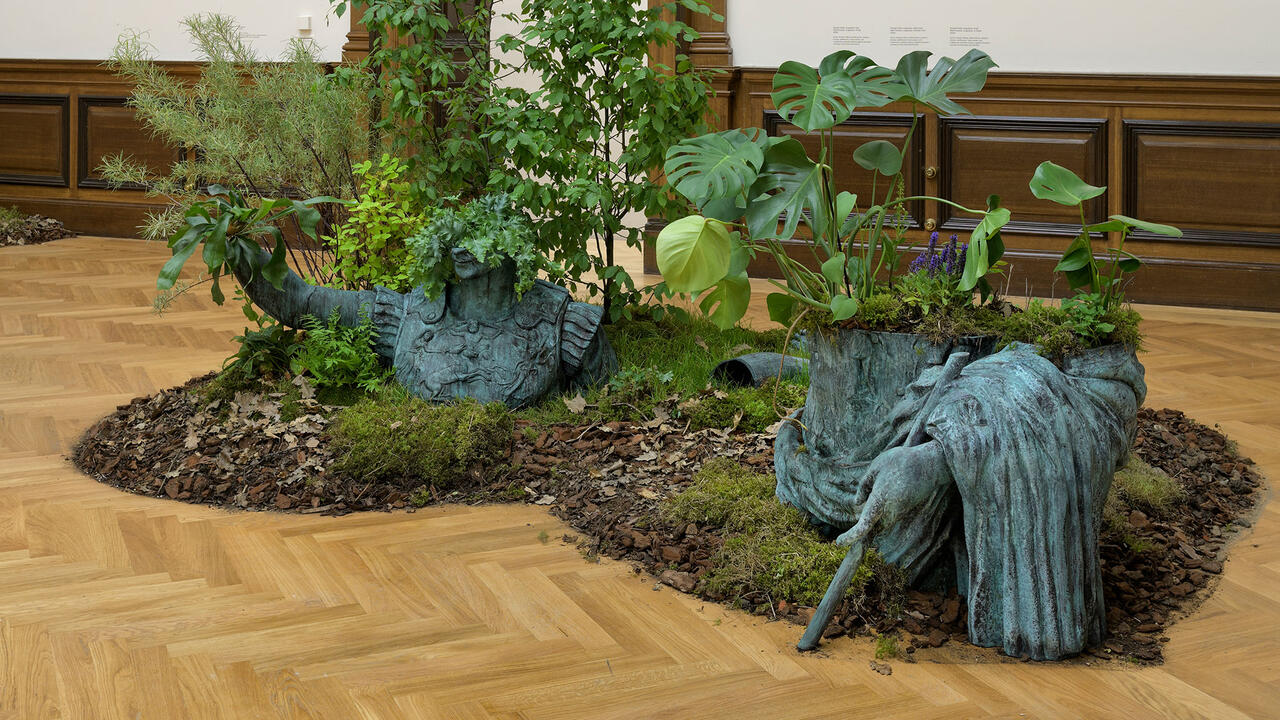Of Its Time
How do artists respond to current events?
How do artists respond to current events?

What happened in 2012?
Otto Muehl, the Viennese Actionist, once kept a diary. A whole year was represented by this line: ‘Extreme Hatred for the Mayor of Vienna.’ Stealing from Muehl, about 2012 I could note: ‘Impulse to Slap All Birthers.’ Through our annus horribilus, or the US presidential campaign, some comfort came from thinking about history: people have always been stupid, wrong. Smart people, with generative ideas, occasionally prevail. This cheered me up.
I tend to believe that, before total annihilation, this clever/dumb species will design ingenious devices to ameliorate the poisonous effects of previous ones. I predict: the end is not near. Believing it, though, could be as reassuring to some as my recourse to history.
Future beings will laugh at us; each generation does about its predecessor. It’s an endless competition. The chunky, clumsy, slow things they devised – electrical wires, sockets. Coming soon – tiny memory implants, iWands.
But let’s not forget forgetfulness: a normal amnesia overwhelms most of any lived life. Recalling a year, last month? Stray scenes can return in startling dreams we usually forget; vague images surface, slip away.
In 2011, with millions, I watched Egypt’s revolution on television: ‘I’m watching history; history is being made.’ But what does that mean, to watch an event that will be recorded, remembered, but not to have been in or of it? Anything could have happened in Tahrir Square. Normal disappeared. A few Americans told me they’d have liked to be part of their revolution. I thought, but didn’t say: a revolution doesn’t send out invitations. The Egyptians weren’t ‘having a revolution’. They were the revolution.
2012 rode in on the back of chaotic, thrilling, frightening political events: the clamouring will of people in the Middle East; the fragility of hope, and rebellion spreading; the instability of the euro and Greece’s desperation; the Occupy movement’s impact; now, street-by-street fighting in Syria, a government slaughtering its citizens, and no stopping yet.
In 2012, on 1 May, I gave a reading at the KGB Bar in the East Village, with fellow writer Colm Tóibín. Afterward, a bunch of us had dinner. About 11pm, in a funky bar on Second Avenue, I heard a guy, who was peering into his iPhone, whisper: ‘Bin Laden’s been killed.’ What? The bar turned dead quiet. He said, louder: ‘Bin Laden’s dead.’ The bartender switched on the television. ‘Bin Laden’s been killed.’ Colm and I walked outside, told passers-by, or they told us: ‘Bin Laden’s dead.’ I admit to shock, excitement, but more a rush of relief. ‘Admit’ because I didn’t expect relief; I didn’t know that particular anxiety was lodged in me. What else didn’t ‘whoever I was’ know that might inflect or form ‘my positions’ and ‘my ideas’?
Unique characters, like Marshall McLuhan, envisioned the future, and speculated brilliantly. But no one knows exactly what’s coming, or the consequences that will follow. No one knows what artists will do next, either, or why. Maybe perceptive, ludic, didactic, inspiring or dull art, film, writing. Contemporary work usually responds obliquely to its time, which necessarily includes the past, hidden or disguised. I didn’t expect relief at Bin Laden’s death, and artists may imagine and describe a surprising object from and of its time, with no obvious source.
In 2012, I saw an exhibition of work by Anna Molska at the gallery Broadway 1602 in New York. I remember her video, The Mourners (2010), in part because it caught me – thematically, formally, psychologically – and made present what I hadn’t expected. Molska asked seven Polish women to participate in a ‘social experiment’. The women were friends, who also had a folk-singing group, and sang songs at funerals. Molksa invited them to use a gallery, once a greenhouse, to do in it what they wanted. She provided neutral-coloured parkas as costumes; and, in the windowed, spacious gallery, one wide bench and a white sheet, which became props.
In about 25 minutes, the women created a play: enacting a funeral, singing to the dead and the living, they danced, rough-housed and laughed. They discussed God and the Devil, telling folk tales and their own stories about dying people. Very early in the improvised drama, one woman said, as if out of nowhere: ‘The Germans thought they were so smart; but they were stupid.’ Suddenly the past joined the present and framed it.
Molska’s camera observes the group, usually in medium shots; close-ups study their happy, impassive, mournful faces. It watches them listening to each other or fashioning the white sheet into a corpse, which they position on the bench. The women sing to it and, as they sing, an unnerving seriousness settles. Their eyes close. Their voices sound like the only music possible for lamentation. Later, World War II returns, when a woman mentions her father being sent to a camp, and her sympathy for orphans. Tears come to their eyes. The work includes much more than I can report.
What happened in 2012?

























